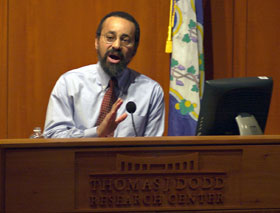Speaker: Civil Rights Progress
Of 50 Years Ago Now Stalled
 |
| Christopher Edley Jr., dean of the law school at Berkeley, speaks about the future of civil rights at Konover Auditorium on Feb. 16. |
|
Photo by Jordan Bender |
Race, says Professor Christopher Edley Jr., dean of the law school at the University of California-Berkeley, “is not rocket science. Race is harder than rocket science.”
Edley, who spoke Feb. 16 at a lecture on the future of the civil rights movement, gave a bleak assessment of the progress made in civil rights in the past half-century. While acknowledging that the days of blatant and, in some cases, legal racial discrimination are long past, he said the persistence of social and economic disparities in America “suggest that the power of the modern civil rights movement to make changes is limited.”
During his talk, given in celebration of Black History Month and sponsored by the Institute for African American Studies, Edley said that ironically, early successes set the stage for later failures. “The leaders of the civil rights movements of the 1960’s did such a thoroughly good job that it looked easy,” he said. “They persuaded us that bringing justice to America was inevitable, that everything was just going to continue apace.”
The 1954 case of Brown v. Board of Education, in which the U.S. Supreme Court ruled that having separate schools for whites and non-whites was unconstitutional, seemed to presage true educational integration. The courts decided that ““segregation of white and Negro children in the public schools of a state, solely on the basis of race, denies to Negro children the equal protection of the laws guaranteed by the Fourteenth Amendment.”
However, Edley pointed out, although many American public schools were initially desegregated, since the late 1980’s, they have become more and more segregated, often on economic lines.
Edley, a member of the U.S. Commission on Civil Rights, also blamed liberals for the lack of progress on racial issues. “The liberals make fine arguments of due process, while conservatives talk about a colorblind society, personal responsibility, and reverse discrimination,” he said. “The conservatives are talking values, and the liberals are talking policy, and the American public is interested in values – not policy.”
Having fair and just public policies is vital, Edley admitted, but “the more fundamental challenge has to do with how to build the moral and political support needed to implement those policies.” The great progress made decades ago also meant that the civil rights leaders of the 1950’s and 1960’s saw no need to train future leaders, he said.
“There is plenty of room for policy innovation,” he said, “but if we get the innovation without leaders to advocate the ideas, and without an effective strategy to engage the opposition and the public on a plane of values, we will not make progress.”
He said that some young people today are consumed with passion and outrage about injustices. They want to make a difference, but they need training to be able to do so.
Closely examining the arguments of those who oppose progress in civil rights may be a key to creating more racial understanding, Edley said: “The starting point is to work very hard to find and understand the kernel of truth in what the other side is saying, because then you are in a position to insist that they do the same for you. And that can be the beginning of building a bridge.”
Still, he maintained, the struggle is far from over. “Race is hundreds and hundreds of years old,” he said, “and America is still screwing it up.”

